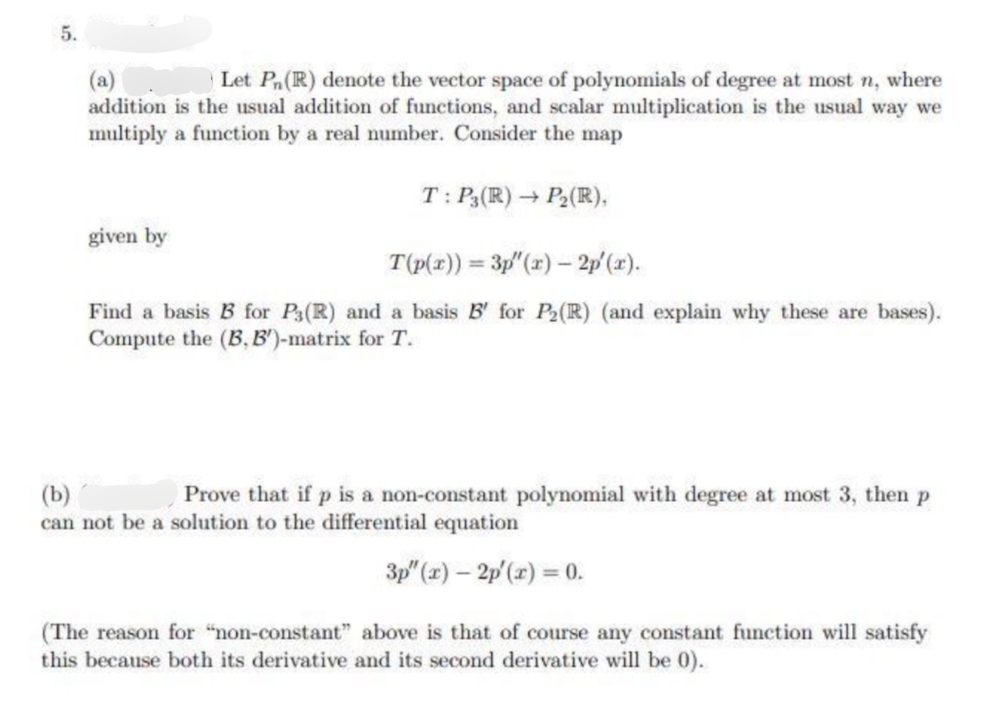(a) Let Pn(R) denote the vector space of polynomials of degree at most n, where addition is the usual addition of functions, and scalar multiplication is the usual way we multiply a function by a real number. Consider the map T: P3(R)→ P₂ (R), given by T(p(x)) = 3p" (r) - 2p'(x). Find a basis B for P3(R) and a basis B' for P2 (R) (and explain why these are bases). Compute the (B, B')-matrix for T. (b) Prove that if p is a non-constant polynomial with degree at most 3, then p can not be a solution to the differential equation 3p" (x) - 2p'(x) = 0. (The reason for "non-constant" above is that of course any constant function will satisfy this because both its derivative and its second derivative will be 0).
(a) Let Pn(R) denote the vector space of polynomials of degree at most n, where addition is the usual addition of functions, and scalar multiplication is the usual way we multiply a function by a real number. Consider the map T: P3(R)→ P₂ (R), given by T(p(x)) = 3p" (r) - 2p'(x). Find a basis B for P3(R) and a basis B' for P2 (R) (and explain why these are bases). Compute the (B, B')-matrix for T. (b) Prove that if p is a non-constant polynomial with degree at most 3, then p can not be a solution to the differential equation 3p" (x) - 2p'(x) = 0. (The reason for "non-constant" above is that of course any constant function will satisfy this because both its derivative and its second derivative will be 0).
Elementary Linear Algebra (MindTap Course List)
8th Edition
ISBN:9781305658004
Author:Ron Larson
Publisher:Ron Larson
Chapter5: Inner Product Spaces
Section5.3: Orthonormal Bases:gram-schmidt Process
Problem 17E: Complete Example 2 by verifying that {1,x,x2,x3} is an orthonormal basis for P3 with the inner...
Related questions
Question
5

Transcribed Image Text:5.
Let Pn (R) denote the vector space of polynomials of degree at most n, where
addition is the usual addition of functions, and scalar multiplication is the usual way we
multiply a function by a real number. Consider the map
T: P3(R) → P₂ (R),
given by
T(p(x)) = 3p" (r) - 2p'(x).
Find a basis B for P3(R) and a basis B' for P2 (R) (and explain why these are bases).
Compute the (B, B')-matrix for T.
(b)
Prove that if p is a non-constant polynomial with degree at most 3, then p
can not be a solution to the differential equation
3p" (x) - 2p'(x) = 0.
(The reason for "non-constant" above is that of course any constant function will satisfy
this because both its derivative and its second derivative will be 0).
Expert Solution
This question has been solved!
Explore an expertly crafted, step-by-step solution for a thorough understanding of key concepts.
This is a popular solution!
Trending now
This is a popular solution!
Step by step
Solved in 2 steps

Recommended textbooks for you

Elementary Linear Algebra (MindTap Course List)
Algebra
ISBN:
9781305658004
Author:
Ron Larson
Publisher:
Cengage Learning

Linear Algebra: A Modern Introduction
Algebra
ISBN:
9781285463247
Author:
David Poole
Publisher:
Cengage Learning

Algebra and Trigonometry (MindTap Course List)
Algebra
ISBN:
9781305071742
Author:
James Stewart, Lothar Redlin, Saleem Watson
Publisher:
Cengage Learning

Elementary Linear Algebra (MindTap Course List)
Algebra
ISBN:
9781305658004
Author:
Ron Larson
Publisher:
Cengage Learning

Linear Algebra: A Modern Introduction
Algebra
ISBN:
9781285463247
Author:
David Poole
Publisher:
Cengage Learning

Algebra and Trigonometry (MindTap Course List)
Algebra
ISBN:
9781305071742
Author:
James Stewart, Lothar Redlin, Saleem Watson
Publisher:
Cengage Learning